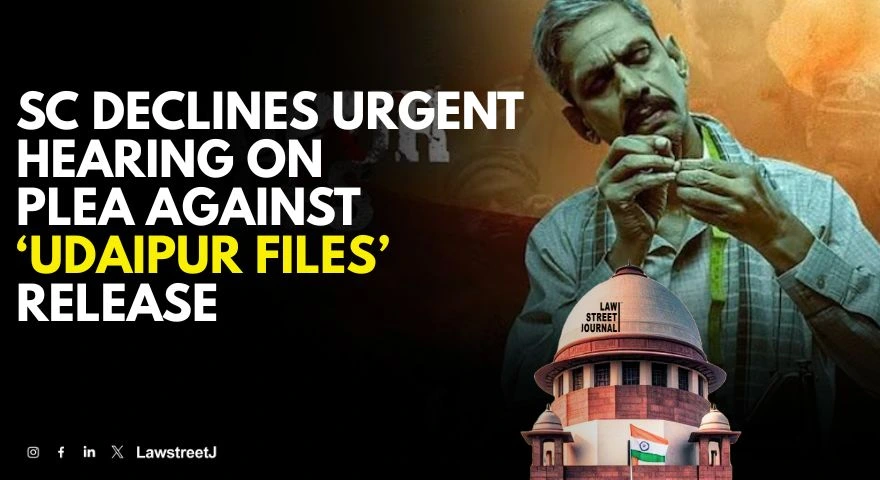NEW DELHI: The Supreme Court on Wednesday refused to consider a plea for urgent hearing a petition against release of movie 'Udaipur Files Kanhaiya Lal Tailor Murder' which is scheduled on 11 July 2025.
A bench of Justices Sudhanshu Dhulia and Joymalya Bagchi said that the matter should be mentioned on reopening of the courts on July 14.
The court's response came as a counsel mentioned the plea on behalf of Mohammed Javed, an accused in the murder of Kanhaiyalal.
The counsel submitted that the Hindi film by then would be released and his right to fair trial would be affected.
"Let it be released," the bench said, declining the plea for urgent hearing.
Javed, one of the accused in the brutal 2022 Udaipur-based tailor, Kanhaiya Lal Teli, murder case has filed a writ petition in the Supreme Court, seeking a stay on the release of the film.
In a separate development, the Delhi High Court decided to hear on Thursday a plea by Jamiat Ulema-i- Hind against the movie on Thursday.
The High Court, however, directed producer of the film, Amit Jani to conduct a private screening for the counsel of the parties. Central Board of Film Certification, however, submitted that 40-50 cuts have been recommended before grant of certificate to the movie. The court directed for listing of the petitions including by
Also Read: Jamiat Ulema files plea in Delhi HC against release of movie 'Udaipur Files'
Javed claimed that the film was communally provocative and could prejudice ongoing judicial proceedings.
It further contended the screening of the film, said to be based on the events pertaining to the case, would violate his fundamental right to fair trial. He sought the stay of the film's release till the trial in the case is over.
Teli, an Udaipur-based tailor, was brutally murdered in June 2022, allegedly by Mohammad Riyaz and Mohammad Ghous. The murder act purportedly recorded by the accused had sent shockwaves across the country.
The case was investigated by the National Investigation Agency (NIA) and offences under the Unlawful Activities Prevention Act (UAPA) and the Indian Penal Code (IPC) have been framed against the accused. The trial is at present going on before the Special NIA Court, Jaipur.
In his petition, the accused claimed that the film, seemed to be communally provocative from its trailer and promotional materials.
"Releasing such a movie at this juncture, portraying the accused as guilty and the story as conclusively true, has the potential to seriously prejudice the ongoing proceedings," his plea stated.
His plea further claimed if the film would be released, then it would very likely compromise the presumption of innocence and risks influencing public opinion in a manner that could affect the fairness of the trial.
"This directly impacts the right to a free and fair trial of the petitioner, as guaranteed under Article 21 of the Constitution," it said.
In its plea, Jamiat Ulema-i- Hind sought to challenge the validity of the certificate by the Central Board of Film Certification (CBFC), claiming that it was in violation of Section 5B of the Cinematograph Act, 1952 and the Guidelines for Certification of Films for Public Exhibition issued under Section 5B in 1991.

















